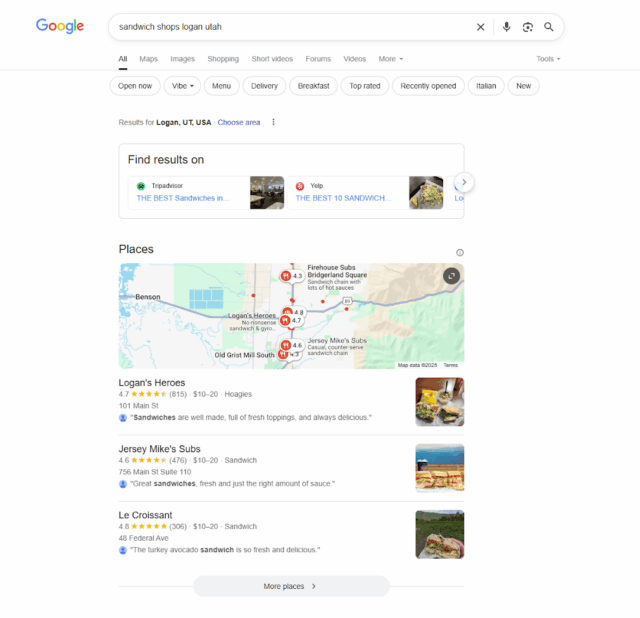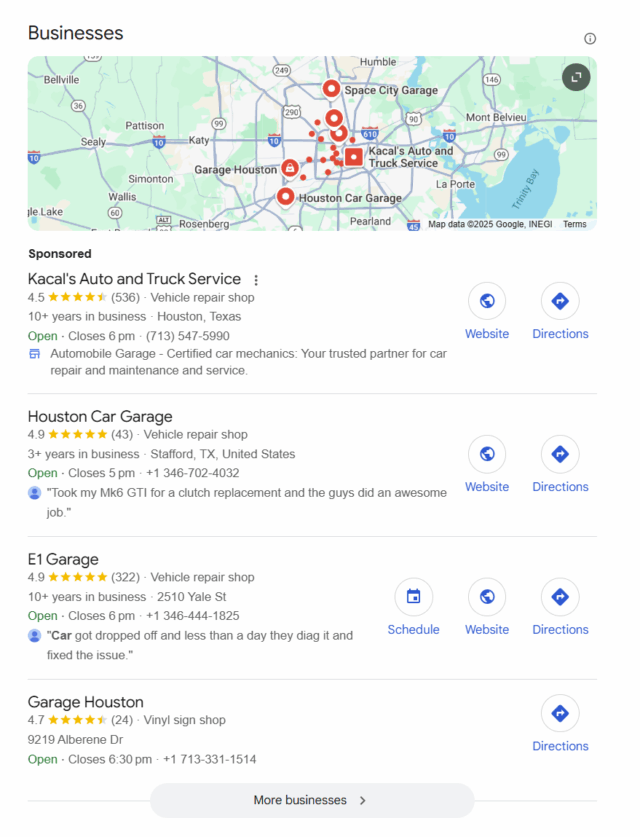
What is the difference between local SEO and traditional SEO?
Last updated on October 9th, 2025
As ever, a huge part of ensuring your business’s success is making sure that you’re appearing before your customers at the right time and in the right place. In an online world, that time and place has become the search engine results page (SERP). The act of learning the algorithm and systems that make up these SERPs—and optimizing your online footprint to match accordingly—is known as Search Engine Optimization (SEO).
SEO is often thought of as a monolith; a highly technical one-and-done process that ensures that your name is in the race. However, SEO is much more complex than that, and can even be broken into multiple subtypes applied across industries. In this article, we’ll be focusing on the two key types of SEO: organic (also known as traditional) SEO and local SEO, and how the two can be used together to create a strong online presence.
What is organic SEO, and what tasks does it entail?
Organic SEO is all of the stuff that people usually name when they think of SEO—think technical, on-page, and off-page. It’s about optimizing a business’s website and the resources pointing towards that website, and includes tasks like:
- Researching keywords
- Analyzing competitors
- Applying on-page SEO fundamentals such as URL shortening, keyword targeting, and internal linking
- Creating SEO-optimized content (and improving your E-E-A-T while you’re at it)
- Investing in technical SEO tasks like fixing broken links, using schema markup, and optimizing website speed and navigability
- Building links to your website

With organic SEO, you’re trying to get your website to rank for a variety of queries featuring specific keywords. Organic SEO is a long and ongoing process that requires frequent tweaking and updates, but yields great reward when it comes to visibility.
Today, most successful companies have some sort of traditional SEO strategy to ensure that they are ranking for relevant searches—especially those who operate heavily in the digital world (spoiler alert: nowadays, that is most companies).
What about local SEO?
Local SEO is all about ensuring that you rank for local searches, or queries that take the searcher’s proximity into account. With local, it’s not all about the website—it’s just as much, if not more, about a company’s Google Business Profile and how it ranks in the map pack. Where organic is broad, local is specific. Where organic applies itself across industries, local focuses on the neighborhood.

In addition to expanding on organic SEO tasks like keyword research, competitor analysis, link building, content creation, and technical SEO with a local lens, local search engine optimization includes additional tasks like:
- Google Business Profile optimization
- Review management
- Local listings building and management (citation management)
Local SEO focuses on the here and now of searches, using explicit search phrases (such as the city name) or implicit searches (such as ‘near me‘) and geotagging to determine what results to show a user. The goal of local SEO is to make sure that it is your business being shown when that user searches in your area.
Like organic SEO, it can be a long and involved process… but, just the same, local SEO is a vital player in ensuring that your business is seen.
If you’re one of three coffee shops on the same street of a hotel, when a tourist searches ‘coffee shops near me’, from their room, you want to be the first one to come up. Local SEO is how you ensure that you do.
What is the main difference between traditional SEO and local SEO?
The main difference between traditional SEO and local SEO is who you’re trying to reach. Larger, location non-specific (think national or global) audiences, such as those targeted by ecommerce brands, will be the target of traditional SEO.
Brands vying for the top spot in search queries like ‘grey cookware set’ or ‘top program for computer science’ or even ‘best social media marketing tools’ will have a distinct focus on organic SEO in their marketing mix.
Local SEO, on the other hand, targets hyper-local, place-based audiences—whether that be within a specific city or even a specific block. These businesses are hoping to increase their rank in the map pack, and are usually targeting queries with a geographical intent, such as ‘chinese food tampa’ or ’24 hour electricians near me’.

These searches are bound by a specific radius. Google also recognizes some terms as inherently local, without the need for modifiers. Think ‘coffee shop’ or ‘pest control’.
Have a look at some example key terms below and how they differ based on general or local search intent.
| Organic SEO | Local SEO |
|---|---|
| womens clothing store | |
| auto repair center | |
| florist tampa |
Do organic SEO and local SEO complement each other?
Both organic SEO and local SEO are vital parts of the marketing mix for any business serving within a specific geographic region. By creating a unified strategy for the two, local businesses can increase their odds of being found by the right customer.
After all, there is no local SEO without traditional SEO. Think of it this way: local SEO is a vital extension of traditional SEO; any of the foundations you build with traditional SEO are reinforced with local SEO. For local businesses specifically, utilizing both will help to form a robust overall SEO strategy that is sure to help drive customers through your doors (whether those be literal or metaphorical doors—looking at you, SABs).
Local SEO vs Organic SEO: Which do you need to do?
Ultimately, in this day and age, all businesses can benefit from a robust traditional SEO strategy. Local SEO, however, has a time and place. When considering whether local SEO is ‘right’ for you, you need to ask yourself a few questions:
- Where is my audience finding me?
- Do I often do business with my customers in-person?
If you answered ‘online’ and ‘yes’ to those questions, you most likely need local SEO in addition to your organic SEO. And while it is possible to implement a local SEO strategy without a formal organic SEO strategy, it is important to consider the ways in which good organic SEO bolsters local. And, as mentioned before, technically there is no local SEO without traditional—when you properly implement a local SEO strategy, you’re sure to be ticking off some organic SEO tasks as you go.
The short answer? All businesses should at least consider having a traditional SEO strategy in place, and any working within a localized region need to also have a local SEO strategy in place.
If you play your cards right and form a strong strategy that incorporates both traditional SEO tactics alongside local SEO knowledge and tasks, you’re sure to see a bump in your online presence.

